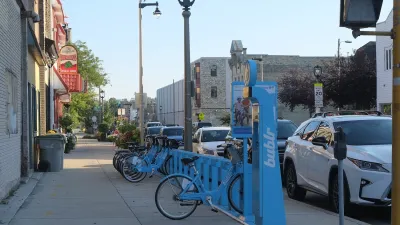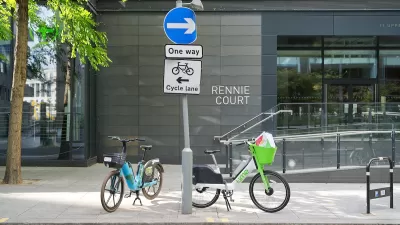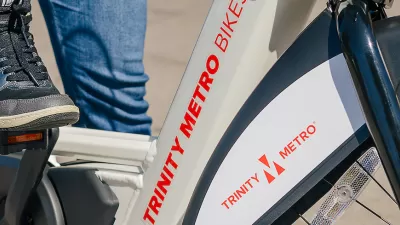In its five years of operation, Detroit’s MoGo bikeshare has added electric and adaptive bikes to its fleet of more than 600 bikes.

Detroit’s bikeshare system is celebrating its fifth anniversary this month. According to a press release from Mogo, “The May 23 anniversary commemorates five years to the day that MoGo launched in Detroit and comes on the heels of reaching the 500,000-ride-milestone.”
“MoGo, with the support of operations partner Shift Transit, title sponsors Henry Ford Health and Health Alliance Plan, Downtown Detroit Partnership, and the City of Detroit, launched on May 23, 2017 with 43 stations and 430 bikes around the Greater Downtown Detroit area, providing active transportation as far east as West Village, north to the North End, and west to Southwest Detroit.” The system started adding electric bikes in 2018.
“Of MoGo’s current Annual Pass members, nearly 30 percent subscribe to the Access Pass, a $5 annual pass which is available to any Michigan resident that receives state benefits such as SNAP or Medicare. MoGo has also offered a cash payment option since launch, giving unbanked individuals the same access to the system.”
The press release notes that “MoGo has also made biking more physically accessible. Through its Adaptive program, MoGo has become a national leader in making biking available to those who may not otherwise be able to ride due to physical or cognitive challenges. This month, MoGo will expand its Adaptive offerings beyond the Detroit Riverwalk to include Downtown Ferndale.”
FULL STORY: MoGo Celebrates 5 Years of Bikeshare Service in Metro Detroit

Trump Administration Could Effectively End Housing Voucher Program
Federal officials are eyeing major cuts to the Section 8 program that helps millions of low-income households pay rent.

Planetizen Federal Action Tracker
A weekly monitor of how Trump’s orders and actions are impacting planners and planning in America.

The 120 Year Old Tiny Home Villages That Sheltered San Francisco’s Earthquake Refugees
More than a century ago, San Francisco mobilized to house thousands of residents displaced by the 1906 earthquake. Could their strategy offer a model for the present?

Alabama School Forestry Initiative Brings Trees to Schoolyards
Trees can improve physical and mental health for students and commnity members.

NYC Outdoor Dining Could Get a Re-Do
The city council is considering making the al fresco dining program year-round to address cost concerns from small businesses.

HSR Reaches Key Settlement in Northern California City
The state’s high-speed rail authority reached an agreement with Millbrae, a key city on the train’s proposed route to San Francisco.
Urban Design for Planners 1: Software Tools
This six-course series explores essential urban design concepts using open source software and equips planners with the tools they need to participate fully in the urban design process.
Planning for Universal Design
Learn the tools for implementing Universal Design in planning regulations.
Ada County Highway District
Clanton & Associates, Inc.
Jessamine County Fiscal Court
Institute for Housing and Urban Development Studies (IHS)
City of Grandview
Harvard GSD Executive Education
Toledo-Lucas County Plan Commissions
Salt Lake City
NYU Wagner Graduate School of Public Service





























